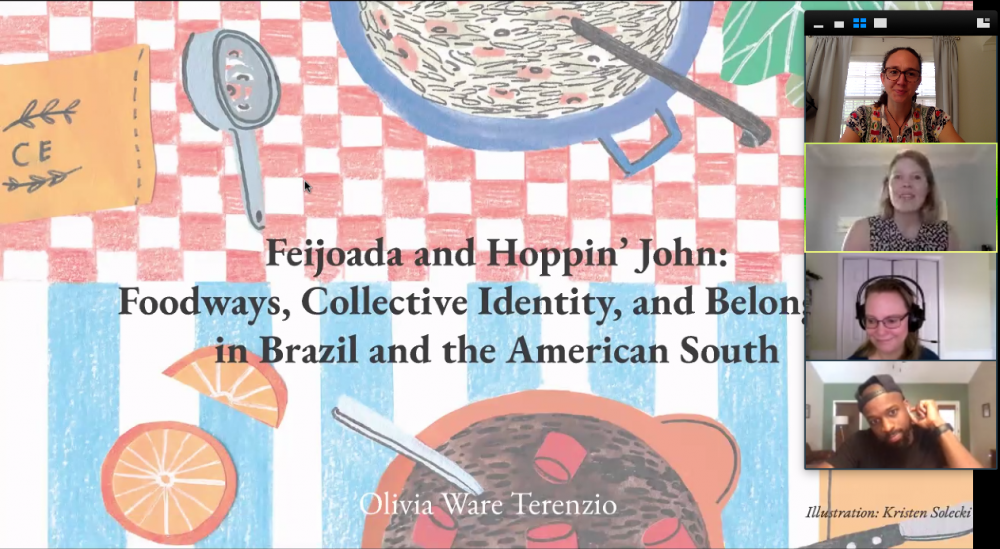Olivia Terenzio Provides Transnational Perspective on the Relationships between Food, Nation, and Racial Formation
Congratulations to the first remote thesis defender
Written by Rebecca Lauck Cleary
Rice and beans are staple foods for many cultures around the world. The combination makes up a complete protein, and is delicious and nutritious.
Olivia Terenzio became interested in the subject of rice and beans after spending a few months in Brazil in 2018 and observing differences in collective identity narratives between Brazil and the U.S. South, where she grew up.
After a decade of writing about food, restaurants, and travel in San Francisco, she returned to her home state of Mississippi in order to explore the role of foodways in the historical construction of national and regional identity in the U.S. and Brazil.
Researching and writing her master’s thesis, “Feijoada and Hoppin’ John: Foodways, Collective Identity, and Belonging in Brazil and the American South,” was a natural extension of her journalism background, since she earned her bachelor’s degree from Northwestern University’s Medill School of Journalism.
Her thesis compares two African-derived dishes – feijoada in Brazil, and Hoppin’ John in the United States – and how each has been used to construct national, ethnic, and regional identity narratives within these two societies of the Americas.
“I am someone who tends to see the world through food, so perhaps it is no surprise that for me, a project of comparisons and contrasts began on the plate,” Terenzio said. “My research questions include: What role do foodways play in narrating, reinforcing, and challenging geographic identities and racial hierarchies? What is erased, who is silenced, and what contested identities are reflected in the performance and celebration of ‘our’ national or regional food?”
As the Nathalie Dupree Graduate Fellow with the Southern Foodways Alliance, her research utilizes a range of sources and methods: historical documents, including cookbooks; sociological, geographical, and anthropological studies; food studies, notably those of the African diaspora; newspaper and magazine articles; and political and social theories.
“I also weave in personal anecdotes concerning a conversation or observation that led to my line of questions, framing research in the context of contemporary debates,” Terenzio said. “The biggest evolution in my work involves the theoretical frameworks that I draw on throughout. Most come from my coursework in critical race and Global South scholarship and enriched my analysis significantly.”
Her thesis committee includes Leigh Anne Duck, associate professor of English; Brian Foster, assistant professor of sociology and Southern Studies; and Catarina Passidomo, Southern Foodways Alliance Assistant Professor of Southern Studies, as chair.
“Olivia is a truly gifted writer and scholar,” Passidomo said. “Her research pushes the boundaries of Southern Studies by offering a truly transnational perspective on the relationships among food, nation, and racial formation and her research is theoretically and empirically grounded, clearly articulated, well-organized, and important.”
Southern Studies scholars have recognized the value of transnational research for some time, and Passidomo says that Terenzio’s study of the discursive use of foodways in Brazil and the U.S. South, creatively demonstrated through two iconic dishes, is among the best examples of transnational Southern Studies scholarship she has encountered.
“Olivia has already published an article that draws on some of her thesis research in Southern Cultures; I hope she continues publishing her smart work so more people can see it,” Passidomo said. “I’m really proud of Olivia. I also don’t think I have anything to do with her success, but it’s fun to be able to cheer her on.”

Terenzio is the first thesis defender of the Spring 2020 semester, and plans for the usual gathering in the Charles Reagan Wilson room of Barnard Observatory were cut short when the University of Mississippi made the decision on March 12 to hold all classes and related coursework online or via methods other than in-person, on-campus instruction due to COVID-19.
So, on March 27, the thesis committee and Terenzio had an online meeting together, followed by a second meeting with only the committee members. When the committee finished discussion, they asked Terenzio to remotely join that meeting, to let her know she successfully defended.
“I’m grateful to my committee for being so flexible and communicative,” Terenzio said. “I know everyone has plenty of distractions and competing priorities right now, and I don’t take their attention for granted.”
